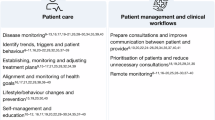Abstract
Personal health records (PHR) are online systems that include collections of patients’ healthcare and medical data, which enable patients to share, organize and manage these data according to their own views. National Health Service (NHS) policy suggests that increasing usage of electronic PHR by patients will result in cost savings and improved public health, especially for people with long-term conditions. This study is part of a larger research project, the ePHRma study.
A prominent question that is the aim of this paper was raised by healthcare providers from the ePHRma study was what are the participants’ PHR preferences?
This study conducted 42 interviews and surveys with adults with heart disease, asthma and diabetes in order to answer the research questions. The people with diabetes cohort has 17 participants, the heart disease cohort has 13 and the asthma cohort has 12 participants. Most of the people with diabetes were using the Freestyle Libre, followed by MyFitnessPal. In total 14 unique PHRs were used by the 17 participants. Most of the people with heart disease were using the Fitbit, followed by Medisafe. In total 8 unique PHRs were used by the 13 participants. Most of the people with asthma were using the Fitbit, followed by Samsung Health. In total 16 PHRs were used by the 12 participants, with 10 of them being unique. The study was given REC/HRA favourable ethical opinion.
Access this chapter
Tax calculation will be finalised at checkout
Purchases are for personal use only
Similar content being viewed by others
References
NHS: The NHS Long Term Plan (2019)
Andrikopoulou, E., Scott, P.J., Herrera, H.: Important design features of personal health records to improve medication adherence for patients with long-term conditions: protocol for a systematic literature review. JMIR Res. Protoc. 7, e159 (2018). https://doi.org/10.2196/resprot.9778
Archer, N., Fevrier-Thomas, U., Lokker, C., et al.: Personal health records: a scoping review. J. Am. Med. Inf. Assoc. 18, 515–522 (2011). https://doi.org/10.1136/amiajnl-2011-000105
Chrischilles, E.A., Hourcade, J.P., Doucette, W., et al.: Personal health records: a randomized trial of effects on elder medication safety. J. Am. Med. Inf. Assoc. 21, 679–686 (2014). https://doi.org/10.1136/amiajnl-2013-002284
Andrikopoulou, E., Scott, P.J., Herrera, H.: Mixed methods protocol for a realist evaluation of electronic personal health records design features and use to support medication adherence (ePHRma). BMJ Heal Care Inf. 27 (2020). https://doi.org/10.1136/bmjhci-2019-100046
IDF: Diabetes Atlas (2019). https://idf.org/e-library/epidemiology-research/diabetes-atlas/159-idf-diabetes-atlas-ninth-edition-2019.html. Accessed 5 Jan 2021
Diabetes UK: Facts and Figures (2019). https://www.diabetes.org.uk/professionals/position-statements-reports/statistics. Accessed 5 Jan 2021
Global Asthma Network: The Global Asthma Report. Auckland, New Zealand (2018)
Asthma UK: Asthma facts and statistics (2016). https://www.asthma.org.uk/about/media/facts-and-statistics/. Accessed 3 May 2018
World Health Organization: The top 10 causes of death (2014). https://www.who.int/news-room/fact-sheets/detail/the-top-10-causes-of-death. Accessed 20 Feb 2021
British Heart Foundation: Facts and figures - Information for journalists. In: Br. Hear. Found (2019). https://www.bhf.org.uk/what-we-do/news-from-the-bhf/contact-the-press-office/facts-and-figures. Accessed 20 Feb 2021
Creswell, J.W., Plano, C.V.L.: Designing and Conducting Mixed Methods Research. SAGE, Los Angeles (2017)
Braun, V., Clarke, V.: Using thematic analysis in psychology. Qual. Res. Psychol. 3, 77–101 (2006)
Ritchie, J., Spencer, L.: Qualitative data analysis for applied policy research. In: Huberman, A.M., Miles, M.B. (eds.) The qualitative researcher’s companion, pp. 305–329. SAGE Publications Inc, Thousand Oaks, California (2002)
Seabrook, H.J., Stromer, J.N., Shevkenek, C., et al.: Medical applications: a database and characterization of apps in Apple iOS and Android platforms (2014)
Papageorgiou, A., Strigkos, M., Politou, E., et al.: Security and privacy analysis of mobile health applications: the alarming state of practice. IEEE Access 6, 9390–9403 (2018). https://doi.org/10.1109/ACCESS.2018.2799522
Olla, P., Shimskey, C.: mHealth taxonomy: a literature survey of mobile health applications. Heal. Technol. 4(4), 299–308 (2015). https://doi.org/10.1007/s12553-014-0093-8
Paton, C., Hansen, M., Fernandez-Luque, L., Lau, A.Y.S.: Self-tracking, social media and personal health records for patient empowered self-care. contribution of the IMIA social media working group. Yearb Med. Inf. 7, 16–24 (2012)
Bouri, N., Ravi, S.: Going mobile: how mobile personal health records can improve health care during emergencies. JMIR mHealth uHealth 2, e8 (2014). https://doi.org/10.2196/mhealth.3017
Pires, I.M., Marques, G., Garcia, N.M., et al.: A research on the classification and applicability of the mobile health applications. J. Pers. Med. 10, 11 (2020)
Francis, M.: 5 types of mobile health apps. In: Skedulo (2018). https://www.skedulo.com/blog/5-types-mobile-health-apps/. Accessed 5 Nov 2020
Stollfuß, S.: Communitainment on instagram: fitness content and community-driven communication as social media entertainment. SAGE Open 10 (2020). https://doi.org/10.1177/2158244020919535
Author information
Authors and Affiliations
Corresponding author
Editor information
Editors and Affiliations
Rights and permissions
Copyright information
© 2022 The Author(s), under exclusive license to Springer Nature Switzerland AG
About this paper
Cite this paper
Andrikopoulou, E., Scott, P. (2022). What Personal Health Records are People with Long-Term Conditions Using?. In: Stephanidis, C., Antona, M., Ntoa, S. (eds) HCI International 2022 Posters. HCII 2022. Communications in Computer and Information Science, vol 1580. Springer, Cham. https://doi.org/10.1007/978-3-031-06417-3_1
Download citation
DOI: https://doi.org/10.1007/978-3-031-06417-3_1
Published:
Publisher Name: Springer, Cham
Print ISBN: 978-3-031-06416-6
Online ISBN: 978-3-031-06417-3
eBook Packages: Computer ScienceComputer Science (R0)




